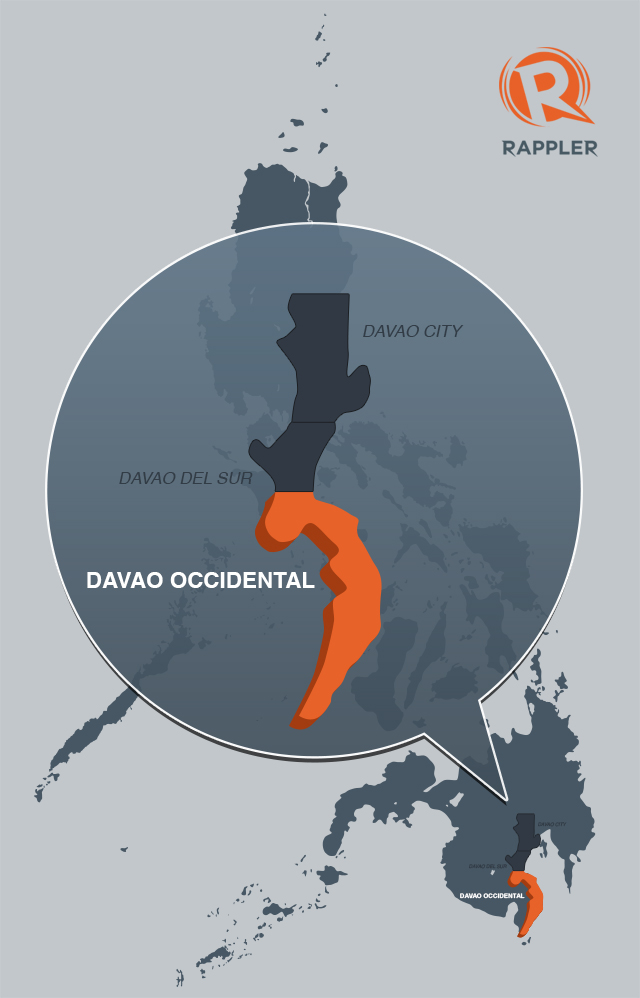
A new province to be called Davao Occidental in Mindanao has been created 4 months before the midterm polls, but the election of its provincial officials will be unlikely until 2016. Republic Act 10360, which carved out the new province from Davao del Sur, was signed by President Benigno Aquino III on Jan 14. It will take effect 15 days after it was published in newspapers on Monday, January 21.
Proponents of splitting Davao del Sur into two provinces originally expected the law to be passed and a plebiscite for its approval held by the end of 2011. It would have paved the way for the election of Davao Occidental’s own governor and other provincial officials and a lone congressman in May 2013.
However, the Senate approved the bill only in October 2012, and the final version of the charter signed just as the election period for 2013 had officially started. RA 10360 says a plebiscite should be conducted by the Commission on Elections (Comelec) “within 60 days from the effectivity of this Charter,” or within two months from February 5. “The first set of officials of the Province of Davao Occidental will be elected in the next national and local elections following the effectivity of this Charter.”
Earlier, the Comelec, as a policy, decided to postpone until after the May 13 polls all the plebiscites that had been scheduled. They included the conversion of Cabanatuan in Nueva Ecija from being a component city into a highly urbanized city that would have created its own legislative district, and the creation of Barangay Paglaum in Bacolod City.
In an interview with reporters on Tuesday, January 22, Comelec chair Sixto Brillantes Jr said no elections will be held in the newly created Davao Occidental. “We cannot hold an election on a divided province, because the prerequisite is, there has to be a plebiscite. We have a previous resolution. We are not holding any plebiscite before May 13, 2013," Brillantes said in a mix of English and Filipino.
“The problem really is that, as of now, it’s physically impossible for Comelec to hold any plebiscite considering the proximity of the elections,” a Comelec source privy to the poll preparations told Rappler earlier. “The configuration of the PCOS and the ballots have started, which obviously didn’t include the new province—unless we re-start everything, which we cannot afford to do at this time,” the source said.
Without a plebiscite before May, Davao del Sur will be intact until the 2016 elections. The gubernatorial fight is a one-on-one between 1st district congressman Marc Douglas Cagas of the Nacionalista Party (son of the current governor) and former congressman Claude Bautista of the Nationalist People’s Coalition.
Davao del Sur has two congressional districts. In 2010, the province was placed under Comelec control because of incidents of violence between the supporters of the Cagas and Bautista clans. The poll body is reportedly considering placing it under control again in 2013.
The newly created Davao Occidental will be composed of 5 municipalities from the 2nd district of Davao del Sur: Malita, Sta. Maria, Don Marcelino, Jose Abad Santos, and Sarangani. The remaining towns of the 2nd district – Kiblawan, Malalag, and Sulop – will be part of the current 1st district to comprise Davao del Sur. The two provinces will then have one congressional district each.
Senator Ferdinand Marcos II, chair of the Senate committee on local governments, had said that the 2nd district’s distance to Digos City, the capital of Davao del Sur, has impaired the delivery of services to the residents and slowed down economic progress in the districts.,“For instance, the town of Sarangani takes about ten hours by boat to reach the municipality of Malita, the proposed site of the new province of Davao Occidental, and about three hours from the municipality of Malita to Digos City,” Marcos had said.
Under Section 450 of the Local Government Code of 1991, as amended by Republic Act 9009, a province can be created if it has a land area of at least 2,000 square kilometers, as certified by the Land Management Bureau; a population of at least 250,000, as certified by the National Statistics Office; and a minimum annual income of P20 million.
Davao Occidental has a land area of 2,183.97 square kilometers; a population of 293,780 as of 2010; and an average annual income of P113.22 million for 2008 and 2009.
http://www.rappler.com/nation/politics/elections-2013/20153-new-davao-province-created,-but-polls-unlikely

No comments:
Post a Comment
Note: Only a member of this blog may post a comment.